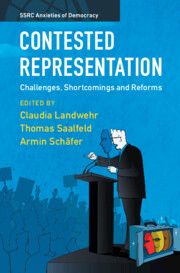Book contents
- Contested Representation
- SSRC Anxieties of Democracy
- Sponsored by the Social Science Research Council
- Contested Representation
- Copyright page
- Contents
- Figures
- Tables
- Contributors
- Acknowledgments
- 1 Introduction
- Part I The Contested Idea of Political Representation
- Part II Representation and Responsiveness in Unequal Societies
- Part III Polarization, New Cleavages, and Shifts in Democratic Government
- Part IV Constitutional Crisis and Institutional Reform
- Bibliography
- Index
1 - Introduction
Published online by Cambridge University Press: 03 November 2022
- Contested Representation
- SSRC Anxieties of Democracy
- Sponsored by the Social Science Research Council
- Contested Representation
- Copyright page
- Contents
- Figures
- Tables
- Contributors
- Acknowledgments
- 1 Introduction
- Part I The Contested Idea of Political Representation
- Part II Representation and Responsiveness in Unequal Societies
- Part III Polarization, New Cleavages, and Shifts in Democratic Government
- Part IV Constitutional Crisis and Institutional Reform
- Bibliography
- Index
Summary
On January 6, 2021, angry supporters of the outgoing president, Donald Trump, stormed the US Capitol building, harassed members of Congress and staff, and mocked democratic symbols. The protestors violently expressed a widespread sentiment among Republican voters that the election was rigged, and that Joe Biden should not be sworn in as the new president of the United States. If democracy depends on the support of those who voted for the losing party to accept the result of the election as legitimate, the events on Capitol Hill showed that this “losers’ consent” (Anderson et al., 2005) is crumbling. Although the degree of polarization in the United States is severe, other advanced democracies face similar challenges. A substantial number of citizens feel that the political system has deep flaws, that politicians have lost touch, and that political decisions do not reflect the preferences of the majority anymore. The chapters in this book highlight the pervasiveness of these problems across a variety of institutional and political settings well beyond the United States.
- Type
- Chapter
- Information
- Contested RepresentationChallenges, Shortcomings and Reforms, pp. 1 - 12Publisher: Cambridge University PressPrint publication year: 2022



